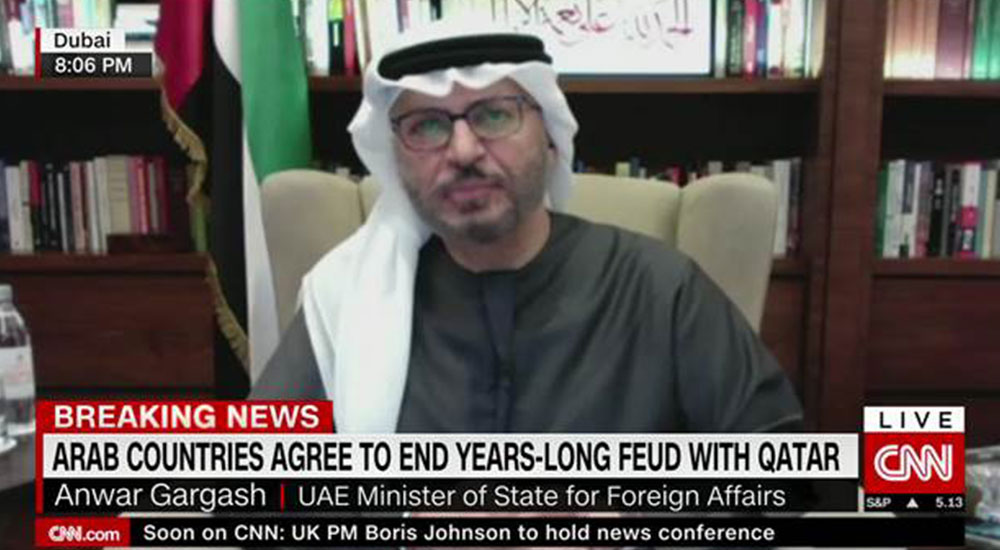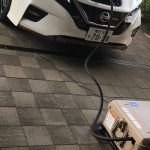UAE minister tells CNN he is very optimistic as Arab countries end feud with Qatar

Speaking to CNN’s Becky Anderson on Connect the World, UAE Minister of State for Foreign Affairs, Anwar Gargash, said he was very optimistic about the agreement Saudi Arabia and its Arab allies signed on Tuesday to restore diplomatic relations with Qatar, adding it will take a lot of transparency and time to rebuild confidence.
He added that following a rift such as the one that the countries have had, the issue of rebuilding confidence is one that takes time, takes some energy, and takes a lot of transparency. The UAE is willing to put all that in order to build these bridges again and to maintain them, because this is good for the UAE, this is good for the GCC, and good for Qatar.
When asked about the Arab quartet’s 13 demands on Qatar from 2017, Gargash said they were considered a maximalist negotiating position at the time but today they ended up with general outlines that basically govern relations between states that are party to the same organisation, the GCC.
Highlights from the interview.
On new beginning and what it means for the region
I think first of all, I have to say that we are very optimistic, I think the first practical thing that it means politically and geo-strategically, that the rift that has, you know, consumed the GCC over the last three, three and half years, has been resolved, beginning a process of healing.
So, I think it means a lot in terms of the ability of the GCC to function fully in the coming period. And to function fully means that politically it will reemerge as the geo-strategic bloc of countries that it has always been. So, I would say that is the first thing in terms of political and geopolitical. The deal basically addresses a lot of the concerns of the various states with regards of how their relationships should be and should be conducted.
I think on other planes it is a deal that will end a lot of the measures that were taken during this period, measures that have affected business, that affected investment, have affected also movement of people within these countries and, of course, Egypt airlines over-flights and so on, so forth. So, the deal has important political ramifications in a really healing rift within the GCC House and I think this will sort of translate itself into a more active and unified GCC geo-strategically. And as I said, also, in other areas to do with business and to do with —
On key differences being resolved
Well, again, you know, we have placed our confidence in the Saudis in leading this process of negotiations, and I think that our confidence is justified and clearly, also the idea basically is to try and the set the rules of non-interference on agreeing on issues that affect all of us, including extremism and terrorism, which are part and parcel of the deal.
We are confident. We are looking forward enthusiastically, but, you know, as you always know the proof is in the pudding, and we hope that we will work together moving forward to ensure that such disruptive rift, one that we’ve all gone through, should not reoccur through transparency and through working together to address these issues.
On the original demands
The 13 demands at the time were considered what I would call a maximalist negotiating position. I think what we end up to deal with is general outlines that basically govern relations between states that our party, to the same organisation, the GCC, and in the case of Egypt, also a member of the Arab League. So these are what I would call general outlines of how this relationship will move on, and I think we’re very satisfied with this. And we want to build on it, and we want to look to the future building on this, and ensuring that in this very turbulent region that the GCC is more solid, more unified, and looking towards the future in unison.
On remaining tensions
I have to be realistic, following such a long rift, it is, I think only natural that we are able to build confidence among the four states of Qatar as we move forward. I think we have a good agreement, we have a good framework, and I think also we’re already working as we speak now on implementation. And I think that we will see implementation quite quickly in many of the measures that we’re taking.
I have to be quite honest, I’m very optimistic, but of course, you always know that following a rift such as the one that we have had, the issue of rebuilding confidence is one that takes time, takes some energy, and takes a lot of transparency, and the UAE is willing to put all that in order to build these bridges again and to maintain them, because we think that this is good for the UAE, this is good for the GCC, and indeed, good for Qatar.
Message to Tehran
I think the first thing is to acknowledge the role that was played by Kuwait and indeed the role that was played by Washington in arriving at this point. It has not been an easy process, but indeed a successful one. But I think the important thing that the GCC, today from Al-Ula is sending, it’s a message of unity, and it’s a message where the GCC seeks what I would say, peaceful orientation with all its neighbours. But at the same time, refute any sort of interference in its affairs. This is also a clause that was in the GCC statement today that came out of Al-Ula.
So, clearly, I think we are quite honest about what we want to see. We want to see a region that is more stable, we want to stay away from threatening language, threatening action. And I think this is the sort of message that we are sending today. I think the main thing that emerges really out of Al-Ula is, number one, is capable Saudi leadership, and at the same time, I would say a united GCC trying to sort of orient itself as one geo-strategic grouping, as it should. There is real concern with Iran’s nuclear programme, there’s a real concern with the missile programme, and there is a real concern with the Iranian regional policy.
I think this is a stated view. But at the same time, I think the GCC is mature in calling for political solutions to these issues, and I think this something where we as a group emerge stronger today following the declaration Al-Ula.
On future US negotiations with Tehran
We really don’t have a very clear idea on how things will develop. But I think a reasonable voice at any sort of conquer with regards to the nuclear deal or beyond has always been also a stated position from the region. But I think for us, we are really following many of the various statements from Tehran, from Washington, from European capitals, and especially, really, from the Biden administration, to sort of see the lay of the land as we move — as we move forward.
Having said that, I think the absence of a regional voice, an Arab regional voice, in the original JCPOA is something that need to be amended, and I think time has shown that it’s very much on point.
On the agreement with Qatar being just a cosmetic fix
I think the first thing to say is that the priority and the Al-UIa declaration is us, the GCC. And I think the first thing is to try and heal a rift within the same organisation, within the same group of countries that share, history, share a lot of familiar relationships,economies and so on and so forth.
So, I would say that the main focus of healing this rift is an internal GCC for our focus. But it has taken long, and I would come and say that the current all-society effort in reaching out to arrive at today’s arrangement, you know, representing us and other countries has not been something that was done in weeks. It’s really taken a long period of time in order for us to arrive at this point. So, my argument would be that any other external concentrations are second, but I think the major, major concentration for the optimism that we see today is very much a GCC reading of where we should be, what we should concentrate on, how difficult the region is, and how do we deal with it.
Now, the issue of, is this cosmetic or no? We have to work at making this deal quite waterproof in many ways. And speaking on behalf of the UAE, we have every intention of ensuring that the Al-Ula declaration is a success, because we feel that it is in the interest of the UAE, and we feel that it is in the interest of the region.
Source: CNN.





